ORANGE COUNTY
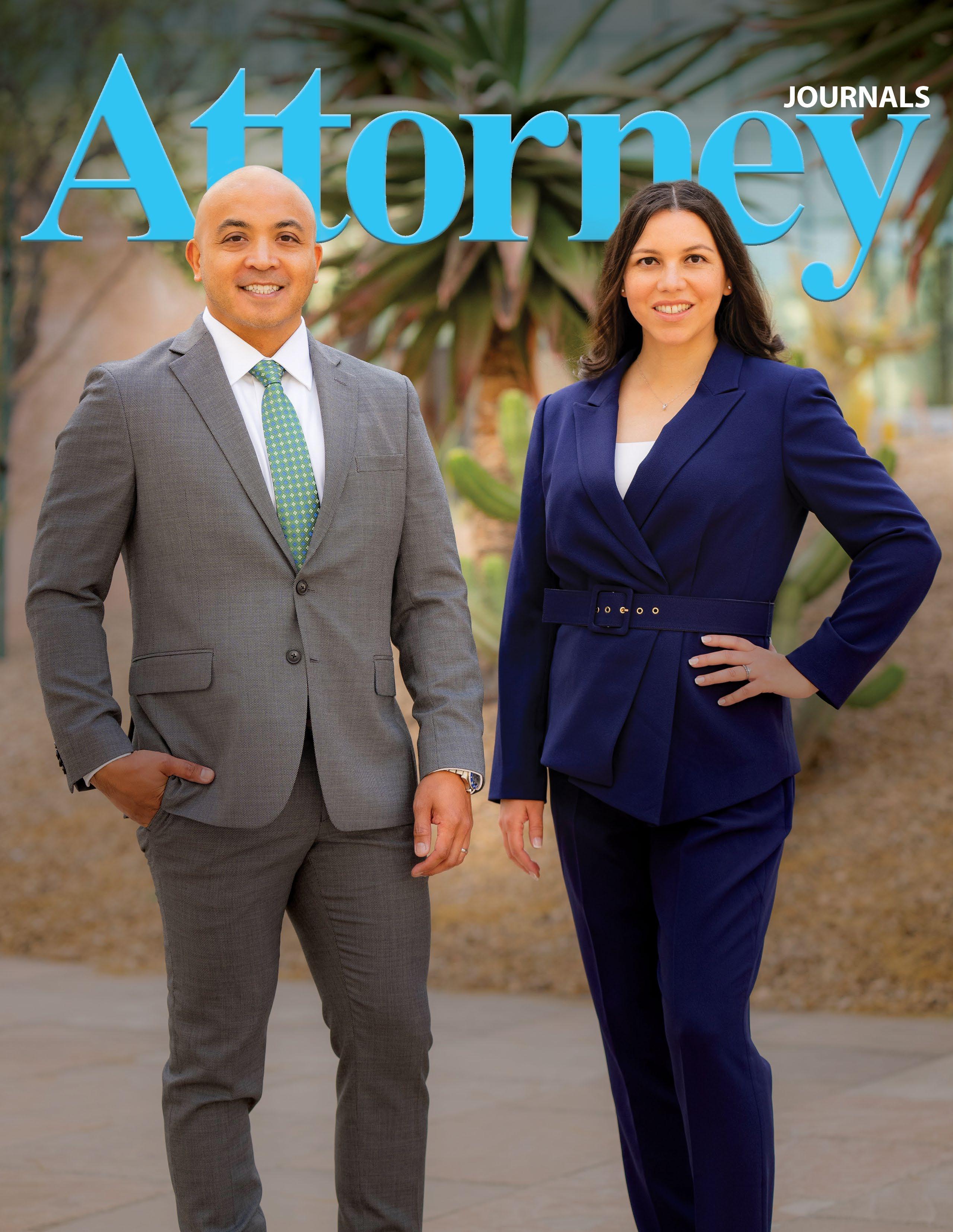
4 Reasons Why, With Thought Leadership, the Best Ability Is Availability
Wayne Pollock
5 Reasons Organizations Should Be Archiving Their Social Media Accounts
Miranda Pang
The Hidden Cost of Bad Data in Law Firms and How to Fix It
Chris Fritsch
Breaking Barriers and Leading With Empathy
5 Signs You Need a Law Firm Marketing Audit
Katie Hollar Barnard
5 Dead Giveaways That Your Website Is Outdated Omnizant
LinkedIn-Sponsored Articles for Law Firms
Evan Powell
Lawyering 101: Marketing Is in the Fine Print
Lindsay Griffiths California Case Summaries Monty A. McIntyre
Lem Garcia Law Serving Orange County
Law Firm of the Month
Volume 218, 2024 $6.95
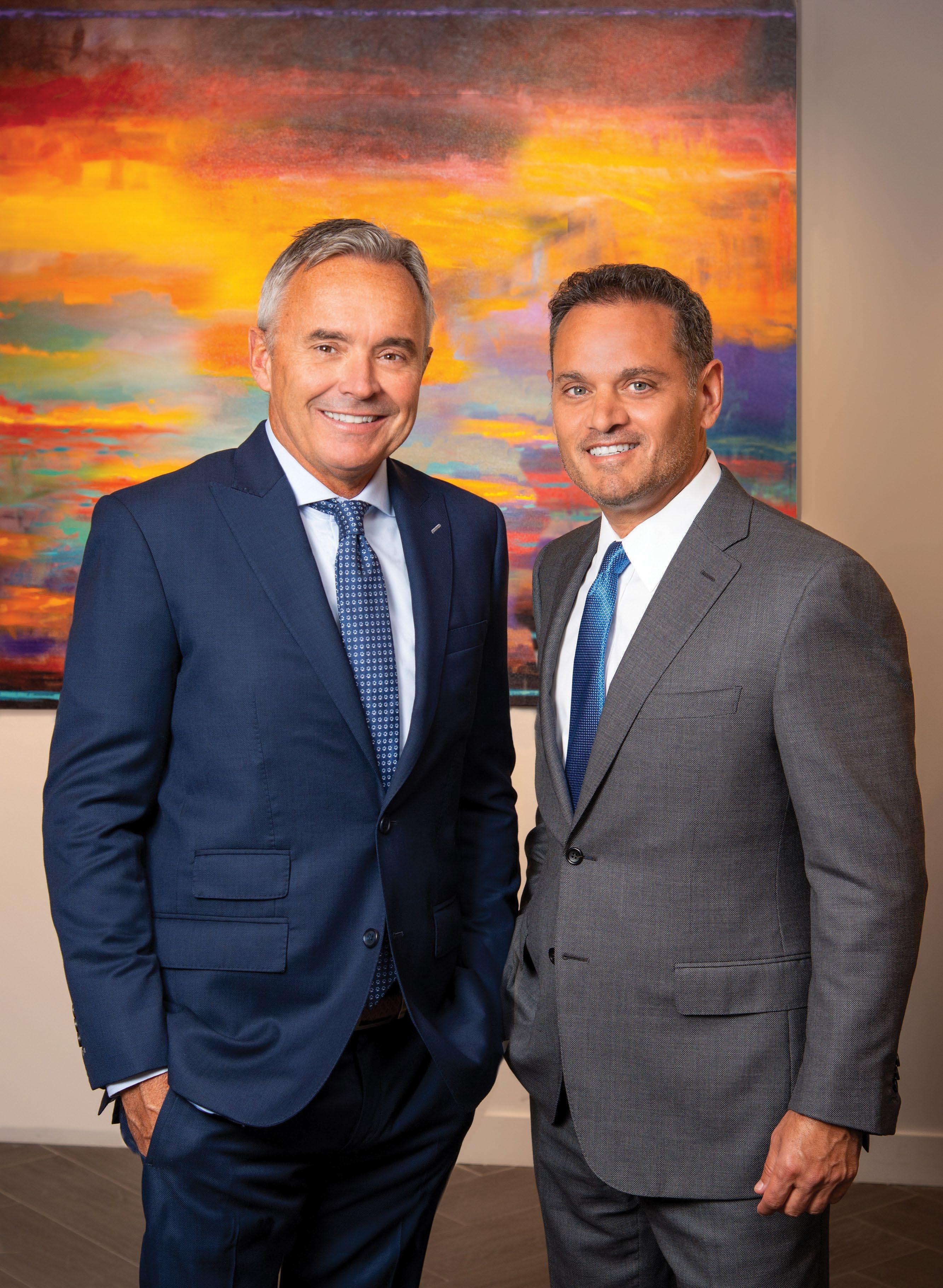

4931 Birch Street, Newport Beach, CA 92660 | (949) 870-3800 | www.bentleymore.com
we provide aggressive
For Last-Minute Trials Referral Fees Paid
Experienced PERSONAL INJURY LAWYERS
At Bentley & More LLP,
legal representation to consumers and employees across California. Our attorneys are fierce litigators with decades of experience advocating for our clients. While we are effective in resolving many kinds of conflicts outside of litigation, we have a proven track record of fearlessness in taking matters to trial and beyond.















NEVADA REFERRAL & CO-COUNSEL RELATIONSHIPS NEVADA’S LARGEST & HIGHEST RATED INJURY LAW FIRM 801 SOUTH 4TH STREET | LAS VEGAS, NV 89101 6900 SOUTH MCCARRAN BLVD., #1010 | RENO, NV 89509 “Rick is one of the best lawyers in the country. I call him every time I have any issue in Nevada and would not hesitate to refer him any type of case of any size.” ~ C. Michael Alder, Esq., Alder Law, Los Angeles, California, CAALA Past President and Former Trial Lawyer of the Year OVER $1.5 BILLION WON FOR CLIENTS PAST RESULTS DO NOT GUARANTEE FUTURE SUCCESS RichardHarrisLaw.com

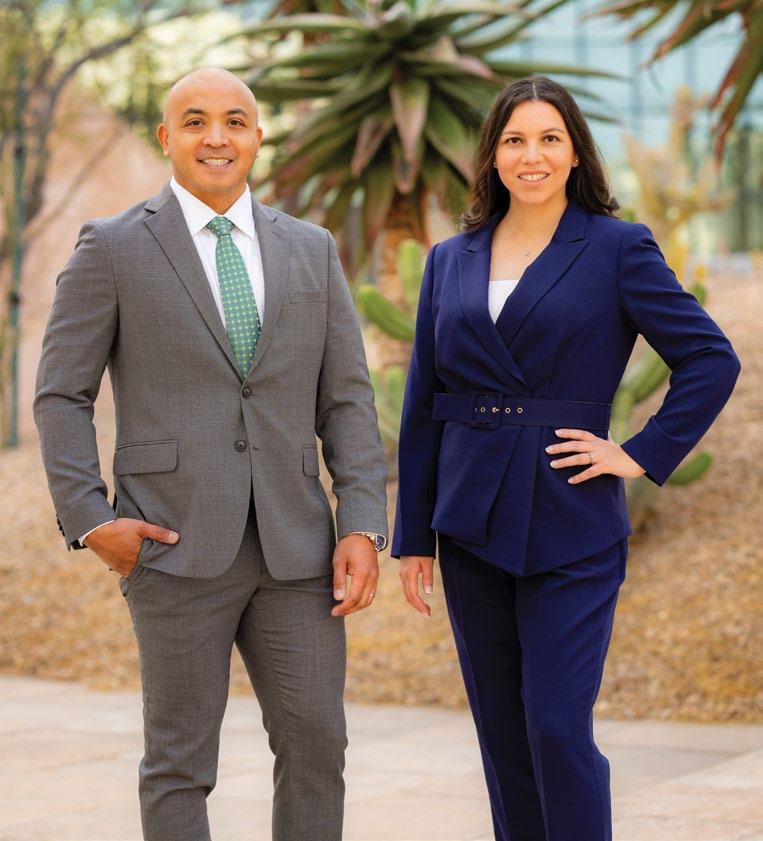


Editorial material appears in Attorney Journals as an informational service for readers. Article contents are the opinions of the authors and not necessarily those of Attorney Journals. Attorney Journals makes every effort to publish credible, responsible advertisements. Inclusion of product advertisements or announcements does not imply endorsement. Attorney Journals is a trademark of Sticky Media. Not affiliated with any other trade publication or association. Copyright 2024 by Sticky Media. All rights reserved. Contents may not be reproduced without written permission from Sticky Media. Printed in the USA 2024 EDITION—NO.218 EXECUTIVE PUBLISHER Brian Topor EDITOR Wendy Price PUBLICATION DESIGN Penn Creative CIRCULATION Angela Watson PHOTOGRAPHY Chris Griffiths STAFF WRITERS Dan Baldwin Jennifer Hadley CONTRIBUTING EDITORIALISTS Katie Hollar Barnard Chris Fritsch Lindsay Griffiths Monty A. McIntyre Omnizant Miranda Pang Wayne Pollock Evan Powell ADVERTISING INQUIRIES Info@AttorneyJournals.com SUBMIT AN ARTICLE Editorial@AttorneyJournals.com OFFICE 30213 Avenida De Las Banderas Suite 200 Rancho Santa Margarita, CA 92688 www.AttorneyJournals.com ADDRESS CHANGES Address corrections can be made via email or postal mail.
6 Four Reasons Why, With Thought Leadership, the Best Ability Is Availability by Wayne Pollock 10 Lawyering 101: Marketing Is in the Fine Print by Lindsay Griffiths 12 California Case Summaries by Monty A. McIntyre 14 Five Dead Giveaways That Your Website Is Outdated by Omnizant LAW FIRM OF THE MONTH 16 Lem Garcia Law, Serving Orange County Breaking Barriers and Leading with Empathy by Dan Baldwin 24 Five Signs You Need a Law Firm Marketing Audit by Katie Hollar Barnard 26 The Hidden Cost of Bad Data and How to Fix It by Chris Fritsch 28 Five Reasons Organizations Should Be Archiving Their Social Media Accounts by Miranda Pang 30 LinkedIn-Sponsored Articles for Law Firms by Evan Powell 26 6 16
TABLE OF CONTENTS


Many abilities are important to the success of an attorney’s thought leadership efforts. But the best ability an attorney can have regarding thought leadership is availability.
There’s a saying in sports that the best ability is availability.
The idea being that the most effective way for athletes to reach the highest levels of performance and help their teams win is to be in the game playing. The best athletes can’t help their teams win if they’re often injured or otherwise regularly unavailable to perform.
The same thing goes for attorneys when it comes to their thought leadership efforts: The best ability is availability. It is not the ability to create engaging content, leverage effective distribution channels, or build an audience.
When it comes to thought leadership, availability means consistently engaging in content creation, consistently attending industry events, consistently participating in online discussions, and generally understanding that successful thought leadership efforts are the ones designed to be executed over the long term, as opposed to a series of one-off actions.
There are four main reasons why availability is important for attorneys when it comes to thought leadership.
Availability Leads to Visibility
When you are consistently creating content, speaking at events, commenting on other people’s social media posts, and generally engaging in thought leadership efforts, you are staying in front of your target audience: clients and referral sources. You are making sure that people aren’t forgetting about you.
Successful marketing and business development depends on you staying top of mind for your target audience. If you rarely engage in the above efforts, you are allowing your peers and competitors who more frequently do so to have more opportunities to get in front of your target audience. That gives them the upper hand when past, current, and prospective clients and referral sources think about which attorneys they’re aware of they can turn to for assistance with a legal or business issue, or who they could refer a prospective client to.
4 Reasons Why, With Thought Leadership, the Best Ability Is Availability
by Wayne Pollock
Availability Makes It Easy to Build Relationships
In the context of thought leadership, availability helps you build relationships.
Consistently attending industry events and chatting with fellow attendees helps you build relationships. So does consistently making yourself available to engage on social media and for networking phone and video calls.
If you’re not available to do these activities, you’re not going to build relationships with new connections or nurture relationships with current ones.
You’re not going to give these people an opportunity to learn firsthand about who you are, the expertise you have, and the knowledge and wisdom you bring to your clients’ legal and business issues. Without doing so, you’re not going to plant the seeds necessary for these people to turn to you when they need someone with your skillset.
Availability Allows You to Capitalize on Opportunities
When you make yourself available to capitalize on thought leadership opportunities, good things happen.
You can respond to emerging trends or legal developments that are important to your clients by creating content that will put you early on in the “news cycle” so that your clients and referral sources see that you have your fingers on the pulse of their industry or the area of law you practice.
Being available also allows you to capitalize on opportunities to speak with the media. If a reporter sees a blog post or an article you wrote, or a social media post you published, regarding a recent legal development or item in the news and wants to speak to you about your thoughts on that topic, you being available to conduct that interview allows you to take advantage of the opportunity and get quoted in a news article.
After you appear in that article, you may be seen by other media outlets (as well as members of your target audience) as a go-to expert for that topic, which may result in future media outlets reaching out to you to discuss timely topics.
Attorney Journals Orange County | Volume 218, 2024 6
Your availability to capitalize on opportunities might also benefit you by allowing you to fill in for someone speaking on a panel at an industry conference or on a webinar. By being able to hop in and participate on a moment’s notice, you get to demonstrate your expertise, knowledge, and wisdom to new audiences because you made yourself available.
Availability Helps You Build Trust and Credibility
Being available to regularly post on social media, publish articles, send email newsletters, publish podcast episodes, and engage in similar activities shows your target audience that you’re committed to your practice and you’re committed to educating them.
That builds trust with clients and referral sources. Consistently “showing up” when publishing thought leadership and engaging in other marketing and business development efforts gives clients and referral sources comfort that you will do the same should they hire you or refer clients your way.
This availability also helps differentiate yourself from your competitors and gives you a competitive edge. You are proactively showing that you are trustworthy and reliable

because you are regularly sharing knowledge and wisdom. If your competitors aren’t as available as you are when it comes to their thought leadership efforts, their prospective clients and referral sources won’t be able to gain a sense that they will be as trustworthy and reliable as you because they won’t have a similar track record to be judged on.
Being Available Is the Best Way to Be
When it comes to attorneys’ thought leadership, their abilities to come up with interesting topics, create compelling content, and reach their intended audiences are important drivers of the success of those efforts.
But, as is the case with sports, attorneys’ best ability when it comes to thought leadership is their availability. n

Wayne Pollock is the founder of the Law Firm Editorial Service. The Law Firm Editorial Service sets free the knowledge and wisdom trapped inside Big Law and boutique law firm partners by collaborating with them to strategize and ethically ghostwrite book-of-business-building marketing and business development content. Learn more at: www. lawfirmeditorialservice.com.




Attorney Journals Orange County | Volume 218, 2024 7

• We Offer FREE CONSULTATIONS
• Available 24/7
• Rated 5-Stars Across the Board
• Voted Best in Orange County
• Millions Recovered for Our Clients
•
• Client Focused, Results Driven
• You Have Injuries, We Have Answers
Personal Injury
Rideshare Sexual Assaults
Motorcycle Accidents
Dog Bites
Car Accidents
Slip and Falls


PRACTICE
AREAS
Truck
Drunk
Rideshare
Bicycle
Wrongful
5 STAR REVIEWS: REAL PEOPLE. REAL INJURIES. REAL MONEY.
Accidents
Driving Accidents
Accidents
Accidents
Deaths
98% Success Rate
WHO HURT YOU? $1.5M AUTOMOBILE $3.25M PERSONAL INJURY $1M TRIP & FALL $925K EMPLOYMENT LAW $865K TRUCKING $600K MOTORCYCLE $550K AUTOMOBILE $475K DOG BITE SANTA ANA 2090 N Tustin Ave, Suite 250 Santa Ana, CA 92705 RIVERSIDE 4193 Flat Rock Rd, Suite 200 Riverside, CA 92505 WEST HOLLYWOOD 925 N La Brea Ave, Suite 521 West Hollywood, CA 90038 BAKERSFIELD 2601 Oswell St, Suite 206 Bakersfield, CA 93306 LAS VEGAS 3651 S Lindell Rd, Suite D169 Las Vegas, NV 89103 REFERRAL FEES PAID RAZAVI LAW GROUP • (949) 500-1926 • ali@razavilawgroup.com • razavilawgroup.com AWARD-WINNING ACCIDENT ATTORNEYS



Lawyers understand better than most the significance of words—after all, who comprehends more than a contract lawyer that a subtle clause can either seal or sabotage a deal?
Yet, who better than your marketing team realizes that “marketing” often carries negative connotations?
It shouldn’t—and I’ll delve into why shortly.
But how many of you (raise your hands) view marketing as something handled sporadically by a group in your office?
How many of you associate marketing solely with brochures and advertisements?
How many of you see marketers as individuals who merely solicit funds and then design logos or ensure an ample supply of business cards?
Okay, lower your hands. I have news for you— marketing encompasses everything you do.
So, oftentimes, we use terms like “marketing,” “business development,” “branding,” and others rather interchangeably. Though nuanced and distinct, for the purpose of today’s discussion, let’s focus on marketing and refer to the American Marketing Association’s official definition:
“Marketing is the activity, set of institutions, and processes for creating, communicating, delivering, and exchanging offerings that have value for customers, clients, partners, and society at large.”
Marketing Is Ubiquitous
When phrased in this manner, it’s evident that much of what you do as a lawyer falls under the umbrella of marketing— even your legal work, which entails delivering offerings that hold value for clients, is marketing. Every interaction you and your firm have with clients, potential clients, and influencers constitutes marketing.
Every time your assistant or the firm’s receptionist answers the phone: Marketing.
Every time a client receives an email from you: Marketing. Every time a client receives a bill from you: Marketing. Every time you discuss your professional endeavors with someone: Marketing.
Lawyering 101: Marketing Is in the Fine Print—How Every Interaction Shapes Your Brand
by Lindsay Griffiths
Every time you welcome a client or potential client into your office: Marketing.
Does that notion unsettle you a bit? It should. It boils down to this: everything you do, from what you convey to how you convey it, to the appearance of your office, to the company you keep, and more, shapes the impression that people form about you and your business—that’s marketing. All of it.
There’s a compelling insight from Blue Kite Marketing on why you should adopt a marketer’s mindset, stating:
“Marketing is something that should permeate your entire organization. After all, every interaction and touchpoint with customers can be scrutinized or applauded and then shared with the world.”
Word of mouth remains crucial in the legal sphere—always has been. With social media, every one of those impressions is not solely experienced by the client, potential client, or influencer; it’s something each of them can share with a broad audience—they’re no longer merely recounting a story among friends and family; they’re posting it online for the world to see.
And guess what? That’s marketing too. Are you certain people are conveying what you want them to about you and your firm?
Blue Kite Marketing emphasizes that “every employee is in the marketing department.” That doesn’t imply that you need to start contemplating running ads or determining the optimal graphics for your brochure (and as a side note, that’s also NOT what your marketing department is doing either).
It signifies recognizing that everything you do—including how you practice law—communicates a message about the kind of lawyer you are. How you manage your clients, engage with colleagues and referral sources, network at events and in social settings, and collaborate with your associates—all amalgamate to represent you as a lawyer.
Have you pondered the kind of experience you’re delivering through those facets? Is it the message you want clients, potential clients, and influencers to perceive about you and share with others? (You may recall we touched on this to some extent in our discussion on personal branding.)
Attorney Journals Orange County | Volume 218, 2024 10
What Sets You Apart
When I pose this question, I’m sure you can instantly recollect your elevator speech—the succinct couple of sentences describing what you do and the value you bring to your clients. And to some degree, that’s what we’re exploring here. But let’s delve deeper.
Blue Kite Marketing posits:
“People use hundreds of products and services every day. About 95 percent of those interactions go completely unnoticed. Another three percent of those experiences are ones that you are complaining about. What makes the remaining two percent worth talking about?”
Reflect for a moment on all the interactions you engage in daily—with colleagues, with providers of goods and services, with family members and friends, etc. Which of those are the most memorable?
Ask yourself WHY those interactions stand out. Perhaps someone went the extra mile when they didn’t have to, or someone comprehended your needs even when articulated differently. Maybe they exhibited exceptional kindness and cheerfulness in a challenging situation, or they recalled something about you from a previous encounter that surprised you.
Jot it down and contemplate how you can translate that into
the kind of service you provide to your clients. If something is memorable for you, it will be memorable for your clients (provided you translate it to address their needs and desires).
When you create memorable experiences for your clients, potential clients, and influencers, you empower them to advocate for you—they’ll be marketing for you. Why is that crucial? We’re far more inclined to consider doing business with someone if someone we trust recounts a remarkable experience they had with that individual—not merely a good experience, but a remarkable one.
Ask yourself today—what makes me worth talking about?
Remember, being an exceptional lawyer delivering client value in your practice is essentially the bare minimum in today’s marketplace. Numerous outstanding lawyers possess excellent education, extensive experience, and aptitude. But what will prompt a client, a colleague, or a friend to endorse someone else from the rooftops? n

Lindsay Griffiths is the International Lawyers Network’s Executive Director. She is a dynamic, influential international executive and marketing thought leader with a passion for relationship development and authoring impactful content. Learn more at www.iln.com.

Are You a Business Owner OR Attorney With a Client Who is Dealing With an ADA Violations Lawsuit? Don’t Panic! (ACT) Now! NATIONWIDE ADA COMPLIANCE SOLUTIONS We have the answers and solutions to all of your ADA compliance issues for your business and/or client. 2041 Riviera Drive Vista, CA 92084 (760) 940-6106 adacomplianceteam.com ADA Compliance Team, Inc. (ACT) COMPLIANCE SURVEYS / ACCESSIBILITY SOLUTIONS / TRANSITION PLANS Attorney Journals Orange County | Volume 218, 2024 11

California Case Summaries New California Civil Cases
by Monty A. McIntyre, Esq.
These recent cases summarized by Monty A. McIntyre are from his publication California Case Summaries™. Monty prepares short summaries (one paragraph), organized by legal topic, of every new published California civil and family law case that California lawyers can subscribe to on either a monthly, quarterly or annual basis. Monty also offers specialized practice area annual summaries in the areas of Employment, Family Law, Real Property and Torts. For more information go to https://cacasesummaries.com. A California civil trial lawyer since 1980, a member of ABOTA since 1995, a past president of the SDCBA and San Diego ABOTA, and also an expert Zoom user, Monty serves as a mediator, arbitrator and referee with ADR Services, Inc. handling cases throughout California in the areas of business, elder abuse, employment/wage & hour, insurance bad faith, legal malpractice, medical malpractice, personal injury, real property and wrongful death. Web: https:// www.adrservices.com/neutrals/mcintyre-monty/. To schedule a matter, contact Monty’s case manager Haward Cho, (619) 233-1323 or haward@adrservices.com.
CALIFORNIA SUPREME COURT
Arbitration
Harrod v. Country Oaks Partners, LLC (2024) _ Cal.5th _ , 2024 WL 1319134: The California Supreme Court affirmed the Court of Appeal, which had affirmed the trial court’s order denying defendant’s motion to compel arbitration of plaintiff’s complaint alleging negligence and elder abuse. Plaintiff signed a power of attorney for health care appointing his nephew, Mark Harrod, as his “health care agent” to make “health care decisions” should plaintiff’s primary physician find plaintiff unable to make those decisions himself. Plaintiff later fell, broke a femur, became unable to walk and was admitted to defendant skilled nursing facility to obtain living assistance and rehabilitative treatment. During the admission process Mark Harrod signed two agreements. The first was an admission agreement that was state-mandated and unalterable. The second was an arbitration agreement. The California Supreme Court concluded that the execution of the optional contract for arbitration was not a health care decision within the health care agent’s authority, and defendant’s owners and operators could not rely on the agent’s execution of the second agreement to compel arbitration of claims arising from the principal’s alleged maltreatment alleged in his complaint. (March 28, 2024.)
Civil Procedure
TriCoast Builders, Inc. v. Fonnegra (2024) _ Cal.5th _ , 2024 WL 763422: The California Supreme Court affirmed the Court of Appeal’s decision that affirmed the trial court’s order denying
plaintiff’s motion for relief from waiver of a jury trial. Plaintiff did not make a jury fee deposit because defendant did so. On the day of trial, defendant said he was waiving his request for a jury trial. Plaintiff asked for a jury trial and offered to post the jury fee deposit. The trial court denied this request concluding that plaintiff had waived its right to a jury trial by not timely depositing the jury fee deposit. (Code of Civil Procedure, section 631.) Although the trial court observed that plaintiff could challenge the ruling by filing a petition for an extraordinary writ, plaintiff did not do so. After a seven day bench trial the trial court found against plaintiff. The California Supreme Court concluded that a trial court is not required to always grant relief from a jury waiver if proceeding with a jury would not cause hardship to other parties or to the trial court. A request for relief from jury waiver always calls for consideration of multiple factors in addition to hardship, including the timeliness of the request and the reasons supporting the request. The California Supreme Court also concluded that when a litigant challenges the denial of relief from jury waiver for the first time on appeal of the judgment of the trial court, where the constitutional right of jury trial has been validly waived, prejudice from the denial of section 631(g) relief will not be presumed but must be shown. (February 26, 2024.)
CALIFORNIA COURTS OF APPEAL
Arbitration
Davis v. Nissan North America, Inc. (2024) _ Cal.App.5th _ , 2024 WL 1130508: The Court of Appeal affirmed the
12 Attorney Journals Orange County | Volume 218, 2024
trial court’s order denying defendants’ motion to compel arbitration in plaintiffs’ action for claims including violations of the Song-Beverly Consumer Warranty Act (Song-Beverly Act; Civ. Code, § 1790 et seq.) regarding a Nissan with an allegedly defective transmission. The Court of Appeal, joining with four other Court of Appeal decisions that had rejected Felisilda v. FCA US LLC (2020) 53 Cal.App.5th 486, and noting the California Supreme Court has granted review to resolve the conflict, affirmed the trial court. (C.A. 4th, March 15, 2024.)
Attorney Fees
Gramajo v. Joe’s Pizza on Sunset, Inc. (2024) _ Cal.App.5th _ , 2024 WL 1250214: The Court of Appeal reversed the trial court’s order denying plaintiff’s request for attorney fees of $296,920 and costs in the amount of $26,932.84 under Labor Code section 1194(a) after the jury awarded plaintiff $7,659.93 in plaintiff’s action for Labor Code violations in connection with plaintiff’s work as a pizza delivery driver. Relying on Code of Civil Procedure section 1033(a), which gives trial courts discretion to deny prevailing plaintiffs their litigation costs when plaintiffs file their case as an unlimited civil proceeding but only recover an amount available in a limited civil case, the trial court denied all attorney fees and costs, concluding that plaintiff’s counsel severely overlitigated the case and the requested fees and costs were grossly disproportional to plaintiff’s limited trial success.
The Court of Appeal disagreed, concluding the trial court did not have discretion to deny plaintiff’s fees and costs in their entirety under Code of Civil Procedure section 1033(a), and plaintiff was entitled to an award of reasonable attorney fees and costs. (C.A. 2nd, March 25, 2024.)
Civil Procedure
Ayers v. FCA US, LLC (2024) _ Cal.App.5th _ , 2024 WL 805660: The Court of Appeal reversed the trial court’s order awarding plaintiff attorney fees and costs totaling $187,747.75 after defendant accepted plaintiff’s January 2021 Code of Civil Procedure section 998 offer to settle plaintiff’s “lemon law” causes of action under the Song-Beverly Consumer Warranty Act (Song-Beverly; Civil Code section 1790 et seq.) for $125,000 plus costs, expenses and attorney fees pursuant to Civil Code section 1794(d). Before the settlement, the parties had exchanged earlier 998 offers, including a 998 offer from defendant in February 2018 to settle for $143,498. The trial court rejected defendant’s arguments that the February 2018 998 offer should have stopped plaintiff’s ability to collect attorney fees, concluding that section 998’s limitations on expense and cost recovery do not apply when the case is resolved by a pretrial settlement, and concluding that an intervening change in law that reduced the maximum amount
plaintiff could recover at trial exempted him from the usual consequences of section 998. The Court of Appeal disagreed, concluding that Section 998 applies to awards of attorney fees and costs pursuant to Civil Code section 1794(d), section 998 applies even where the litigation is terminated by settlement, and section 998 makes no exception for an intervening change in law. The case was remanded and the trial court was instructed to enter a new judgment exclusive of any costs, as such term is used in section 1032(b), incurred by plaintiff after the date of defendant’s February 16, 2018 section 998 offer. (C.A. 2nd, February 27, 2024.)
Torts
Fraser v. Farvid (2024) _ Cal.App.5th _ , 2024 WL 510111: The Court of Appeal affirmed the trial court’s order granting defendant landlord’s motion for judgment notwithstanding the verdict after the jury found for plaintiff against defendant and awarded plaintiff $600,000 for the injuries he suffered after he was attacked by two pit bulls who escaped from a single-family residence. Under California law a landlord is only liable if they have actual knowledge that the dog of a tenant is dangerous. In this case, while the evidence established the landlords knew there were dogs on the property, plaintiff failed to prove that defendants had actual knowledge the dogs were dangerous. (C.A. 2nd, February 9, 2024.)
Settlement
BTHHM Berkeley, LLC, et al. v. Johnston (2024) _ Cal. App.5th _ , 2024 WL 1336433: The Court of Appeal affirmed in part, and struck in part, the trial court’s order enforcing a settlement term sheet and entering judgment against defendant pursuant to Code of Civil Procedure section 664.6 (section 664.6). The Court of Appeal affirmed in part, concluding that the settlement term sheet was enforceable under section 664.6, the liquidated damages of $250,000 was not unreasonably out of proportion to the $2.2 million settlement, and defendant failed to show the liquidated damages provision was unreasonable under the circumstances as required by Civil Code section 1671(b). However, the trial court erred in awarding prejudgment interest. Section 664.6 authorizes a trial court to enter a judgment reflecting the terms of the parties’ settlement agreement—nothing more, and nothing less. Prejudgment interest is not a cost, but an element of damages. By awarding prejudgment interest to compensate plaintiff for damages it suffered by virtue of defendant’s failure to pay, the trial court entered a judgment that differed materially from the terms of the parties’ agreement, and to that extent it was unauthorized. The portion of the judgment providing for prejudgment interest was stricken. (C.A. 1st, March 28, 2024.) n
13 Attorney Journals Orange County | Volume 218, 2024

Yes, your audience is noticing that outdated copyright year in your footer. While you might order pizza from a website that’s straight out of 2005, you probably wouldn’t trust a lawyer with a site like Saul Goodman’s.
Many firms are guilty of these blatantly outdated mistakes, despite how obvious they are. But it’s 2024 and there’s no excuse.
From COVID messaging to ancient blog posts, we’ll cover five dead giveaways that your law firm’s website is outdated—and what you can do about it.
1. You Still Have a COVID Message
Your visitors will immediately be suspicious if your site still has a 2021-era COVID message like, “As the world continues to stay home in the interest of safety, we are offering remote consultations.”
It’s fine if COVID transformed some of your business practices. Remote consultations are great, and it’s okay to be clear about any health or masking policies. However, all messages need to be written so they’re actually relevant to 2024, instead of holdovers from the early days of panic.
Delete your COVID messaging and make sure there’s no trace of it on your home page. If your practice area is in a relevant industry, move all your COVID content to a separate page like “How we handled COVID.”
2. The Copyright Year in Your Footer Is Old
“Copyright 2017” is a serious red flag. This makes it seem like you haven’t updated your site since 2017—and maybe it’s true!
The copyright year in your footer serves as a notice to visitors that your website’s content is protected by copyright law, meaning that you have exclusive rights to reproduce, distribute, and display the content.
Update the copyright year annually. This demonstrates that you’re actively maintaining and protecting your intellectual property rights.
3. Your Last Blog Post Was… A Long Time Ago
Expertise is not eternal. If your blog posts are dated more than a year ago—or if they’re undated—your online visitors may doubt whether you’re up to speed with the industry. At the very least, a big gap in blog post publishing shows disregard for consistency. If you haven’t posted in a while, it’s likely that you may also need to audit your blog posts. A strong content strategy requires ongoing edits and adjustments.
Delete any posts that aren’t high-quality. Edit and migrate posts that can be saved, and be sure to include the new pub date. Commit to a sustainable content publishing strategy going forward to keep first impressions positive—and good SEO juice flowing.
5 Dead Giveaways That Your Website Is Outdated
by Omnizant
4. It’s Not Responsive or Accessible
Nothing says “1995” like a website that doesn’t resize automatically on mobile devices. If your site isn’t responsive, we’re sorry to say that you may need a new developer or a brand new site.
It’s equally jarring for visitors to see sites that ignore accessibility. Alt text is easy. Designing for screen readers is straightforward.
Ultimately, failure to prioritize accessibility for all your users— like disabled users using assistive technology or commuters on their phones—alienates a significant portion of your audience. It also reflects poorly on your firm’s commitment to inclusivity and user experience.
Lack of accessibility is a relic of the past. Get with the times. If you need an accessible website template you can customize affordably, these options are ADA-compliant.
5. Your User Experience (UX) Stinks: Broken Links, Old Photos, Etc.
Truly, bad UX might be the final straw for some of your visitors. People expect more from websites, and they’ll click off a site that doesn’t meet their desire for seamless navigation and aesthetic satisfaction.
The good news is that, as expectations for website design quality have skyrocketed, so has the availability of design tools.
There’s no excuse for bad design in 2024. You can find a budgetfriendly website developer who prioritizes accessibility and good design.
REVIEW AND NEXT STEPS
We understand that design isn’t everything. But everybody judges a book by its cover—and that judgment often determines whether they actually read the book itself.
Outdated design is concerning to online visitors, and it’s probably losing you business. People notice more than you think they notice. They’re less willing to accept bad design nowadays, especially in high-value, high-trust scenarios like hiring a lawyer. Fixing an outdated website is a great investment of your time and money. If it’s as simple as deleting a COVID message, great! If there’s more work to be done, you might need a new design and new strategy to bring your firm into the modern age. n

Since 2006, Omnizant’s team of digital marketing experts, designers, developers and writers has helped over 2,000 law firms develop powerful websites that drive business growth. Learn more at www.omnizant.com.
Attorney Journals Orange County | Volume 218, 2024 14
More Than $500 Million Recovered For Clients Since 2010
RECENT WINS
$10.5 Million Pedestrian Wrongful Death
$9.6 Million Bus Roll Over
$6.5 Million Semi-Truck Accident
$5.5 Million Rideshare Accident
$5.2 Million Semi-Truck Accident
$4.65 Million Semi-Truck Accident
$3.65 Million Auto Accident
$2.7 Million Pedestrian Wrongful Death
$1.75 Million Trip & Fall Accident
$1.65 Million Slip & Fall Accident
$1.65 Million Auto Accident
$1.5 Million Auto Accident
$1.5 Million Auto Accident
$1 Million Auto Accident
$1 Million Slip & Fall Accident

Referral Fees Paid PATHWAY LAW FIRM, PC 9454 Wilshire Boulevard, Suite 303, Beverly Hills, CA 90212 Phone: (310) 414-3898 | Fax: (310) 414-3899 | www.pathwayfirm.com
INJURY LAWYERS P A THWAY PRACTICE AREAS Wrongful Death Catastrophic Injuries Car Accidents Truck Accidents Construction Accidents Slip & Fall Accidents Motorcycle Accidents Bicycle Accidents Aviation Accidents Spinal Cord Injuries Sexual Abuse Employment Law
Joe Nazarian, Founder and Managing Partner of Pathway Law Firm
BREAKING BARRIERS AND LEADING WITH EMPATHY
by Dan Baldwin
THERESE GARCIA’S IMPACT AT LEM GARCIA LAW
In the competitive world of personal injury law, Therese Garcia of Lem Garcia Law (LGL) stands out as a transformative figure. As the firm celebrates its tenth anniversary, her influence is evident in how LGL has redefined client relationships and set new standards for the industry.
EMPATHETIC LEADERSHIP AT ITS CORE
Therese Garcia, with her deep roots in public interest law, infuses a philosophy of empathy across Lem Garcia Law. This approach transcends mere understanding—it’s about deeply connecting with and anticipating the needs of clients, ensuring that every interaction is not just informed by genuine care and attention, but also enhances the representation they receive.
“Empathy is the cornerstone of justice. At LGL, we don’t just listen to our clients; we feel with them,” she says. “This connection does more than drive our success—it empowers us to tell our clients’ stories more effectively, capturing the true extent of their pain and suffering, and increasing their recovery.”

Under her leadership, LGL has revolutionized client onboarding and communication, establishing the firm as a beacon of trust and efficiency from the very first interaction. Her sharp legal skills, combined with unparalleled empathy, enable LGL to secure better outcomes by presenting each client’s case not just as a set of facts, but as a personal narrative that demands justice and fair compensation.
LEM GARCIA’S STRATEGIC VISION
While Therese Garcia improves client service and results through empathy, Lem Garcia sharpens LGL’s focus by dedicating the firm entirely to personal injury cases. This specialization ensures the firm excels in delivering topnotch representation.
He continuously enhances his skills by immersing himself in the latest legal strategies within the personal injury field. He keeps abreast of cutting-edge practices by regularly attending seminars, reading current literature, and engaging with industry leaders. He is excited to use advanced strategies to challenge insurance companies, pushing them to pay maximum compensation for their clients.
16 2024 LAW FIRM OF THE MONTH JOURNALS Attorney Journals Orange County | Volume 218, 2024
Attorneys:
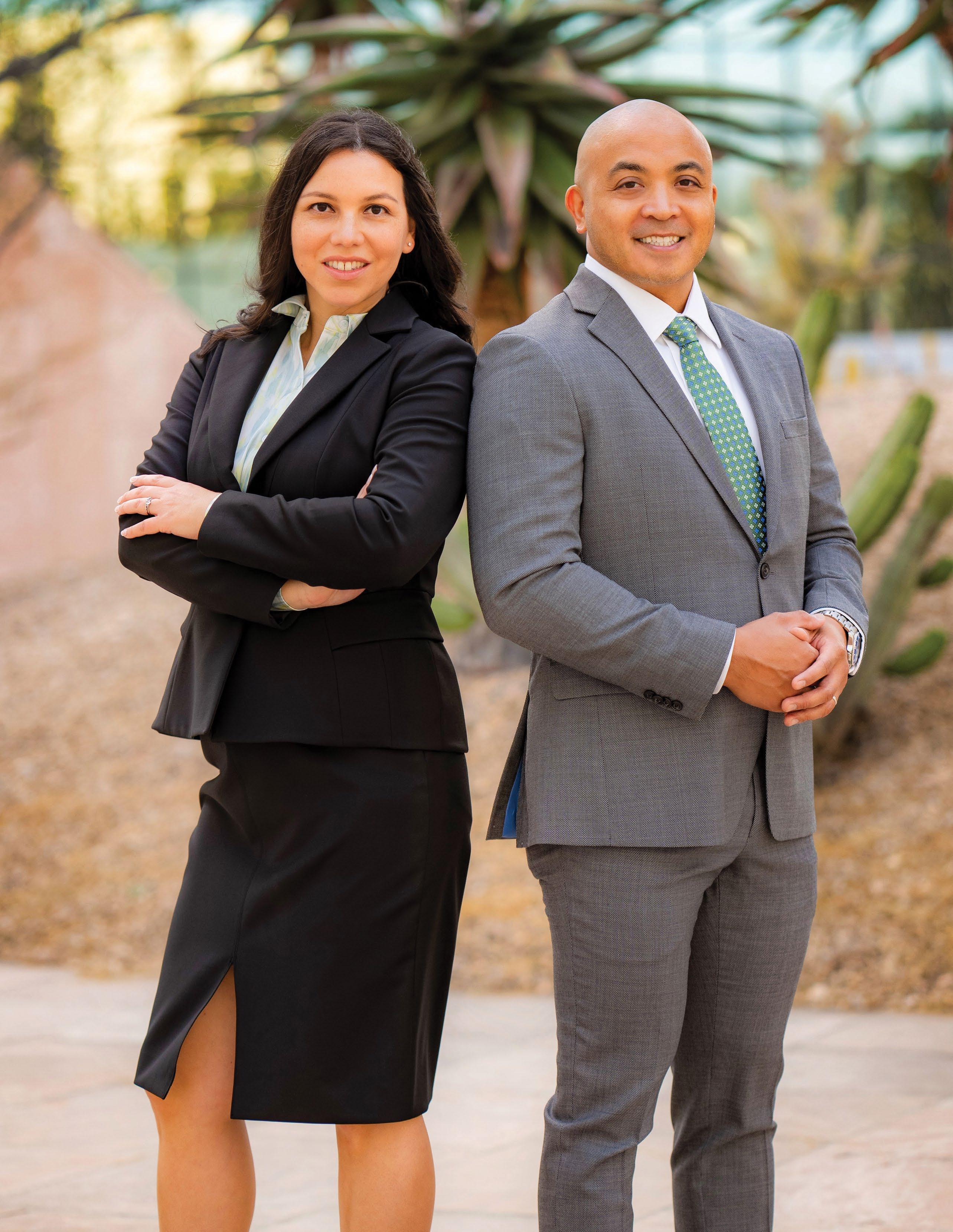
© Christopher TODD studios
Therese Garcia and Lem Garcia
“By focusing only on personal injury, we can really sharpen our skills to provide superior service and results. Our deep dive into the field makes sure that our clients receive the most advanced legal strategies to date,” he says.
Therese Garcia’s expertise perfectly complements Lem Garcia’s strategic focus, which created a powerhouse team known for exceptional service and remarkable results. Their collaborative efforts have secured monumental settlements, including figures of $8 million, $3 million, $2.75 million, and multiple cases over $1 million, solidifying their status as leaders in the field.
REDEFINING CLIENT EXPERIENCE
From its inception, LGL differentiated itself by placing an obsessive focus on the client experience—an uncommon practice in personal injury law back in 2014. Therese and Lem Garcia recognized early on that by elevating the level of service, they could influence the entire industry to shift toward better client care.
“We knew that if we could provide an exceptional experience along with outstanding results, not only would our clients benefit, but it would also push the entire industry to raise their standards,” Therese Garcia says.
This focus has paid dividends. Starting with zero clients and zero reviews, LGL has grown to handle thousands of cases, accumulating hundreds of five-star reviews along the way. Their success in providing five-star service has spurred competitors to improve their own client service, thereby elevating the industry as a whole.
A previous client, Lourdes Markeson, says, “They [LGL] were super attentive and always made themselves available to answer my questions and concerns. They communicated with compassion and empathy where I felt like a priority to them. When you’re in a lot of pain, unable to work and under financial stress, you want to feel the confidence that you’re in good hands. I would highly recommend Lem Garcia Law.”
EMPATHY EXTENDS TO STAFF AND WORK CULTURE
At LGL, empathy extends beyond client interactions and is deeply embedded in the firm’s work culture. Therese has cultivated an environment where staff well-being is a priority, recognizing that a supported and valued team is essential for delivering exceptional service. Every member of their staff is naturally caring and empathetic, a critical trait they prioritize during the hiring process. This ensures that their team not only excels in their roles but also truly connects with and understands the clients they serve.
“Creating an empathetic workplace is key to our success. We make sure that our team feels respected and supported so that they are empowered to give our clients the attention and support
that they deserve. We have the best team—they truly care about others and feel their pain, which is fundamental in how we handle every case,” Therese Garcia says.
COMMUNITY IMPACT AND ADVOCACY
Beyond legal victories, Therese and Lem Garcia’s influence extends into the community. Her role as a Human Resources Commissioner for the City of West Covina and her involvement with various civic activities underscore her commitment to public service. LGL’s support for local schools, sports leagues, and scholarships exemplifies a deep-rooted belief in giving back and nurturing the community that sustains it.
“Our engagement in the community is an essential part of who we are as a firm. We believe that the practice of law is not only about winning cases but also about making a difference in the community. We want to improve the lives of people around us and make a more just society,” she says.
A UNIQUE PERSPECTIVE AS FILIPINO-AMERICANS
As Filipino-Americans, Therese and Lem Garcia have navigated the challenge of breaking cultural barriers in a field where representation is limited. Their success serves not only as an inspiration to other Filipino-Americans considering a legal career but also enhances the diversity within the legal community, enriching the profession with broader perspectives and experiences.
LOOKING TO THE FUTURE
Looking forward, LGL aims to continue its trailblazing approach to legal services. Therese Garcia views the next phase of growth as an opportunity to further cement LGL’s role as a beacon of client-centered service in the legal field.
“We are excited to keep pushing the boundaries of what a personal injury law firm can be. Our goal is to continuously improve and refine our services, not just for our clients, but to elevate the entire field,” she says.
The Garcias plan for steady and solid growth in the next five years. They are not on a quest for quick wins. Their focus is on providing the best client experience to people who need help, and from that they expect long-term success. They believe that sustained effort and persistence is what builds a lasting business. Their team concentrates on providing outstanding results and service one client at a time, rather than relying on aggressive advertising and marketing tactics.
They are also expanding the firm’s awareness efforts by creating more content online and in carefully-planned and extensive use of social media that is helpful, entertaining, and informative.
They believe that their firm’s brand equity and customer loyalty was built over time through consistent, high-quality
18 Attorney Journals Orange County | Volume 218, 2024

Ten years of partnership in life and law,
consider their greatest achievements to be their three children,
© Christopher TODD studios
Therese and Lem Garcia
Josephine, Simone, and Colette.

service, which has led to sustainable growth from return clients and their referrals. Their previous clients are the firm’s organic brand ambassadors, which is more effective and less costly than billboards and exorbitant pay-per-click campaigns.
“Our mission is to not just practice law and deliver outstanding results and service. Our mission is to shape the future of the industry with a bold and empathetic approach to business, leadership, and community engagement. We don’t want to just be a success story, we want to be the blueprint for the next generation of law firm owners. I think there is nothing more rewarding than helping people,” Lem Garcia says.
A LEGACY OF INNOVATION AND EMPATHY
Therese Garcia’s leadership at Lem Garcia Law is a testament to the power of combining professional excellence with a commitment to empathy. By focusing heavily on the client experience and satisfaction, LGL has not only set a new standard for legal services but has also prompted a broader industry shift towards more client-focused practices.
In an industry often characterized by heavy advertising and an impersonal approach, Therese and Lem Garcia have built a lasting legacy that champions the human side of law, ensuring that clients feel valued and supported throughout their legal journeys.
“They attentively listened to our story, displaying genuine empathy and a strong belief in advocating for the justice that was rightfully deserved. This support made us feel reassured and relieved, knowing that we had dedicated allies in our pursuit of justice,” says previous client H Perry.
As LGL moves forward, it carries forward the dual legacy of outstanding legal outcomes and impactful client relationships, a model for future legal practices that prioritize service as much as success. n
Contact
Lem Garcia Law, PC 1720 West Cameron Avenue, Suite 210 West Covina, CA 91790 (626) 337-1111 www.lemgarcialaw.com
20
Attorneys:
Attorney Journals Orange County | Volume 218, 2024
© Christopher TODD studios
Lem Garcia and Therese
Garcia

• Websites • Presentations • Social Media • Email Marketing Writing, graphic design and marketing strategy for … • Branding • Press Releases • Print & Digital Ads • Business Cards • Newsletters • Blog Posts • Marketing Campaigns • Brochures, Flyers & More We’ll Help Your Firm Get Noticed! Women-Owned Business • 215-550-1435 • penn-creative.com











The Injury Brothers, LLP 11440 W. Bernardo Court, Suite 300, San Diego, CA, 92127 Phone: (858) 800-4000 | Fax: (888) 721-4207 | www.theinjurybrothers.com Referral Fees Paid MILLIONS OF DOLLARS WON 100% SUCCESS RATE Personal Injury • Workers Compensation • Wrongful Death Macyh Nawaey, Esq.

It’s nearly unanimous: 95 percent of law firms say that because marketing is a non-billable expense, the spending risk is greater, according to a CallRail survey.
But despite this inherent risk, many law firms take a somewhat scattershot approach. Some might chase the next big thing, and others may stay with what’s worked in the past, but neither are analyzing results beyond the anecdotal level—or taking corrective action.
To wit: In the same CallRail survey, respondents ranked social media as the No. 1 most valuable channel for lead generation…and they also ranked social media the No. 1 worst performer. “Almost every channel was considered underperforming by almost 20 percent or more of law firms,” CallRail noted.
With the average law firm marketing budget clocking in at 7 percent of revenue, it’s worth taking the time to make sure your marketing activity is getting the right results. Just as financial audits ensure accuracy and detect problems within your firm’s books, a marketing audit can shine a light on what’s working well, what’s not, and how you can adjust for better ROI.
What Is a Marketing Audit?
No two firms are alike; a family law practice will have a different marketing mix than a corporate firm. While the tactics may be different, a law firm marketing audit should examine activity, spend and results in three main categories: attracting business, winning business, and retaining business.
Attracting business: Within its particular ecosystem, how effectively does the firm get itself in front of potential clients and referrals? What is the strength of its brand and marketing materials? Is the website attractive, user-friendly and search-optimized? What is its share of voice in key publications? How well does the firm and its lawyers use social media? How competitive is the firm in credible industry rankings?
Winning business: When the firm has a specific opportunity to serve a specific prospect, how well does it close? How does it present capabilities in pitches and proposals? What are the patterns for business won and business lost? What messages are particularly effective? Who does the firm lose business to, and why?
Retaining business: How well does the firm keep and grow its current clients? What kind of outreach does the firm maintain between matters (and invoices)? How does the firm reach out to former or inactive clients? How does the firm obtain and act upon client feedback? What is the state of the firm’s current online reviews?
A helpful marketing audit will not only dive into topics like these, it will synthesize findings into recommended actions, sorted by priority and timeline. We like to start each audit with a color-coded overview— similar to what you get at a car tune-up—that shows at a glance what’s working well (green), what could use some adjustment (yellow), and what needs attention now (red).
5 Signs You Need a Law Firm Marketing Audit
by Katie Hollar Barnard
When Do I Need One?
While in a perfect world, law firms could take time every year to do a deep dive into their marketing, perfect need not be the enemy of the good; there’s significant value in sporadic reviews. It’s a great time to do a marketing audit if:
• You’re not sure how to get started: Maybe you just launched your firm, or maybe you’re looking to grow business beyond your immediate network. A modified marketing audit can help you prioritize your time and spend.
• Your firm has changed: Maybe you merged with another firm, opened a new location or added a large new practice area. When your service offering shifts, your marketing mix should too.
• Your phone isn’t ringing: If you’ve experienced a dropoff in the quantity or quality of client queries, diagnose the actual problem before pivoting (or continuing to throw good money after bad leads).
• You’re in the midst of succession planning: If some of your most high-profile rainmakers are preparing to retire, a marketing audit can help you understand where that might leave you vulnerable— and what kind of messaging and outreach can position you for a smooth transition.
• You don’t know what’s working: If you are spending 7 percent of your revenue (or more!) on marketing but aren’t sure what it’s doing for you, a marketing audit can help you establish benchmarks with peers, set metrics for your firm moving forward, and ensure your spend is productive.
Note that audits need not be firmwide, either; specialty practice or industry teams can audit their group’s marketing activity separate from the macro firm.
Think about planning your marketing like you do your healthcare. Before you spend money on a treatment plan, you’d want to make sure you were accurately diagnosed to begin with (and no, the marketing equivalent of WebMD does not count). This means reviewing your history, asking some detailed questions and running a few tests. Again, 95 percent of lawyers view marketing spend as inherently risky. Marketing audits will help you lower your risk and increase your ROI through a thorough diagnostic process and a proper prescription. n

Katie Hollar Barnard Is the Founder and Chief Executive Officer for Firesign to help legal industry clients attract, win, and retain business. She draws upon more than 10 years of experience at two of the nation’s largest law firms to build brands that connect and business plans that deliver. Learn more at www. firesignmarketing.com.
24 Attorney Journals Orange County | Volume 218, 2024




















We invite you to visit our Las Vegas office, located across the street from the Courthouse, where we offer attorneys use of our full courtroom to conduct focus groups, mock trials, and witness preparation.
Panish | Shea | Ravipudi LLP attorneys fight every day to obtain justice for our clients and make a difference in their lives. But our expertise in personal injury litigation doesn’t stop at the California state line. With 20 attorneys licensed in Nevada, we have obtained record results in the state. The firm
all joint venture opportunities, including with attorneys who want to stay more actively involved in a case. 877.800.1700 panish.law STRENGTH BY YOUR SIDE ® We’ve Got Nevada Covered Too. MEET OUR NEVADA LICENSED ATTORNEYS
welcomes
CALIFORNIA | NEVADA

In today’s data-driven world, law firms rely on large amounts of data to develop relationships, win new business, and serve client needs. Whether attorneys or professionals are managing client relationships in their CRM or leveraging knowledge and experience management systems, accurate data is vital for firms to thrive in the increasingly competitive legal market.
However, trusted research organizations report that 90% of client data in CRM systems is incomplete. Inaccurate contact information, outdated case information and duplicate records aren’t just eyesores, they’re costing firms dearly.
Gartner recently reported that bad data is costing businesses a staggering $12.9 million in lost revenue. What is even more concerning is that this bad data is sabotaging business initiatives, causing 40% to fail due to ineffective strategies created from flawed data analysis.
The good news is there are a few simple, yet effective strategies you can follow to preserve your data from going bad and prevent your firm from incurring unnecessary costs.
1. Standardize Data Entry
One of the biggest challenges to achieving data quality success is outdated or incomplete records and inconsistent data entry. Maintaining clean and correct records isn’t just a matter of good practice, it is a fundamental requirement for effective legal operations.
To overcome the issue of inconsistent data entry and incomplete records, we recommend that firms create and implement a data standardization guide. This documentation clearly establishes guidelines and protocols for entering and formatting data across the firm. By defining standard formats, naming conventions, and validation rules, firms can increase data quality and the operational efficiency of their firm. The standardized data makes it easier to analyze and aggregate important
The Hidden Cost of Bad Data in Law Firms and How to Fix It
by Chris Fritsch
information, and can be used to create reliable reports supporting informed decision-making.
2. Deduplicate Contact Records
Duplicate data can hinder a firm’s ability to operate efficiently, maintain data integrity, and deliver highquality legal services. Duplicate records can take up unnecessary space within a database and can cause staff to spend extra time and effort to reconcile the duplicate entries.
To effectively clean duplicates, firms should start by analyzing their existing data to identify all duplicate records. After all the dupes have been identified, firms can then leverage data cleansing tools that have the processing capabilities to consolidate duplicate records across large data sets with minimal intervention. After automated tools are used, we highly recommend having a staff member conduct manual reviews of the identified records to confirm the irregularities have been fixed.
Proactive measures can also be taken to prevent duplicate records from being entered again, like regular data audits to ensure the initial clean was effective, and to refine any automated algorithms used to identify and consolidate records.
3. Dedicate Data Quality Resources
The biggest mistakes we see when trying to achieve data quality success is failing to dedicate the necessary resources to maintain the data. Over time, data can quickly become outdated or incorrect as people change jobs, organizations merge or get acquired, and other irrelevant records go unnoticed in your system. These persisting records can reduce the overall reliability of the technology, causing professionals to not want to use the system since they cannot trust the data.
26 Attorney Journals Orange County | Volume 218, 2024
To mitigate the degradation of your firm’s data quality, firms must allocate dedicated resources to maintain their system’s records. Data Stewards or CRM Administrators can be hired internally to conduct regular data audits and provide ongoing user training to convey the importance of maintaining data quality on an individual basis, and its impact on the system’s integrity.
For firms with limited budgets and resources, outsourcing these data management positions can offer a cost-effective solution to effectively maintain its CRM data. Outsourced service providers have access to specialized expertise and deep industry knowledge, ensuring the utmost quality of work. They also have access to advanced technologies that may be too expensive for smaller or mid-sized firms. External providers can cost-effectively enhance data management processes for law firms while enabling their professionals to deliver exceptional services to clients.
Maintaining accurate and reliable data is crucial for firms to stay competitive and relevant in today’s competitive legal landscape. Research underscores the significant financial costs and business-related impacts of bad data quality, emphasizing the urgency for firms
to address these issues. Implementing strategies such as data standardization guides or deduplication efforts can yield substantial benefits by enhancing data quality and streamlining database management.
However, sustaining data quality requires dedicated resources and ongoing commitment from firm personnel. Firms can ensure the long-term health of their data by hiring internal resources like Data Stewards or CRM Administrators, or hire outsourced service providers to manage your data cleaning.
In the dynamic realm of law, prioritizing data integrity isn’t just a best practice—it’s essential for law firms aiming to excel and thrive in an increasingly datadriven world. n

As a CRM Success and Business Development Technology Consultant, Chris Fritsch works together with leading professional services firms across the country to help them select and implement the right Client Relationship Management and eMarketing solutions to support their marketing and business development efforts and maximize value and return on investment. Learn more at www.clientsfirstconsulting.com.
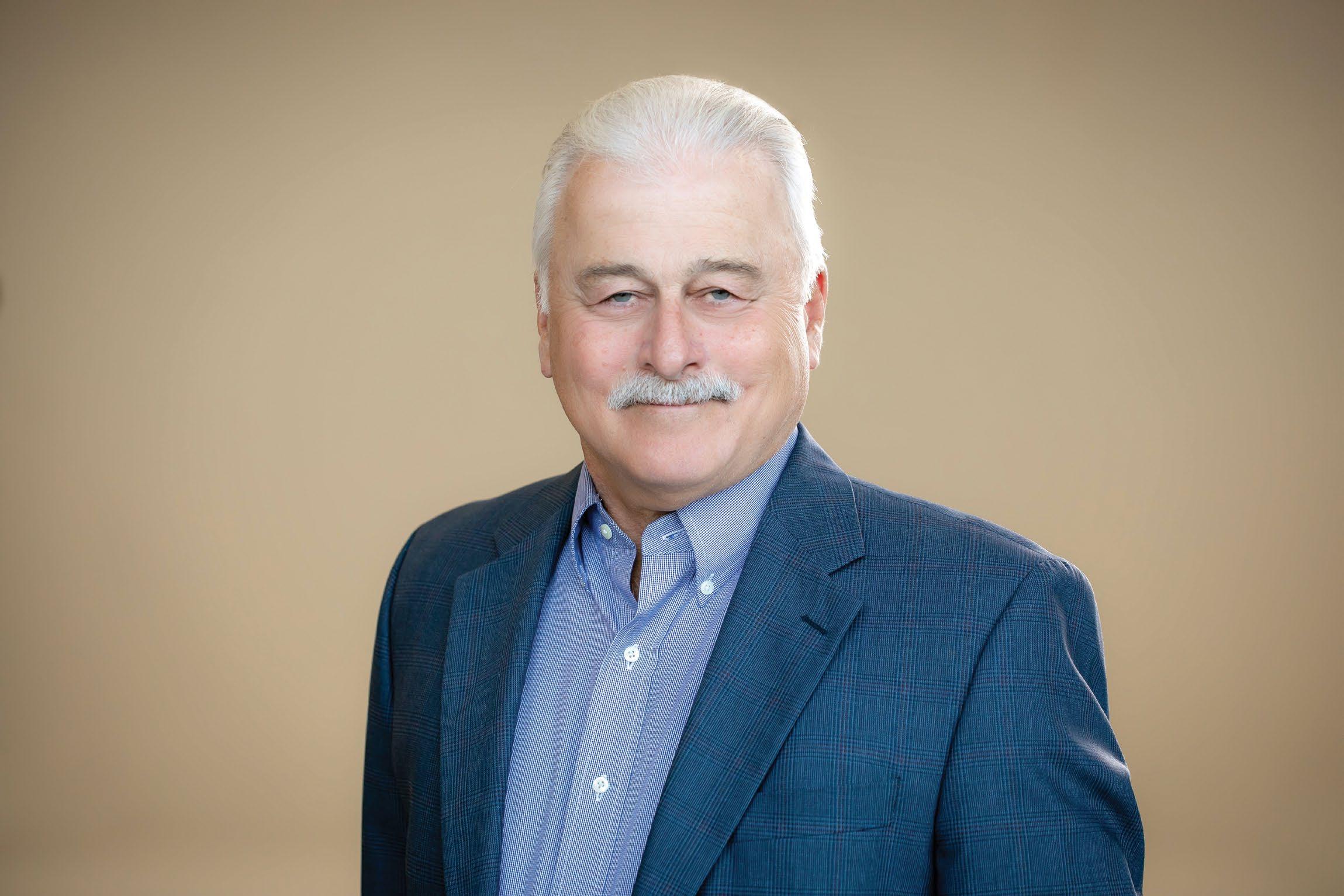 Monty A. McIntyre, Esq. Mediator, Arbitrator & Referee ADR Services, Inc.
Monty A. McIntyre, Esq. Mediator, Arbitrator & Referee ADR Services, Inc.
To schedule, contact Haward Cho: (213) 683-1600 and (619) 233-1323 or haward@adrservices.com

Short summaries (one-paragraph), organized by legal topic, of every new published CA civil case, helping CA attorneys save time, win more, and make more money. Monthly, quarterly, annual, and annual practice area publications are available. Subscribe at www.cacasesummaries.com
Attorney Journals Orange County | Volume 218, 2024 27

In an era where a single social media mishap can spiral into a legal nightmare, social media archiving is increasingly becoming a safety net for organizations.
Social media archiving entails the capture, collection, and preservation of social media content shared by an organization, including comments and likes. Ideally, your social media archiving solution will also capture comments that have been edited or deleted by other users.
WHY SHOULD ORGANIZATIONS ARCHIVE THEIR SOCIAL MEDIA?
Social media archiving is a safeguard for your organization’s digital footprint. Easy access to authenticated records of advertising campaign materials, customer comments, brand statements, and other communications ensures businesses are prepared to examine and produce records quickly, when they really need them.
In this article we’ll explore the five reasons why your organization should be archiving their social media data and what access to these kinds of records could mean for litigation readiness, reputation management, and maintaining proper data governance.
1. Meeting Industry Regulations and Standards
Official use of social media is often subject to industry and government recordkeeping requirements. The specifics of these requirements vary by industry and state government.
According to FINRA Rule 10-06, for example, financial firms are required to preserve their social media records—failure to do so can lead to significant fines. These regulations enable investigators and auditors from U.S. Securities and Exchange Commission (SEC) to hold financial service providers accountable to their claims made in advertising and endorsements, preserving the integrity of the financial system.
Social media archiving has also become crucial in educational institutions. It is easy for underaged students to have personal identifiable information (PII) posted on an official school social media account. With this in mind, more schools have started to archive social media communication records to help resolve privacy concerns of students into the future.
In most cases, regulations and requirements for record keeping are stricter than you may realize—social media archiving is a cautionary practice that could save you in future audits or investigations, and help you adapt as your industry’s regulations and digital record keeping standards evolve.
5 Reasons Organizations Should Be Archiving their Social Media Accounts
by Miranda Pang
2. Improving Information Governance
Social media never sleeps. The expectation for businesses to appear omnipresent across all social media platforms is well established. Even for a company with a more ‘minimal’ approach to posting and online engagement, data can quickly accumulate and represent a substantial data source that needs to be managed.
Social media archiving helps businesses regain a sense of order while facilitating better access to the data for the purposes of review and improving business operations.
Having social media activity archived and easy to access means much more efficient and effective data governance. This is especially important in regulated industries, where your stakeholders may need access to specific information at a moment’s notice.
Though social media platforms allow you to download data from the platform provider, this data is not organized, easily searchable, and is presented out of context, making it less useful for improving info governance.
3. Litigation Readiness
Litigation involving social media is growing and organizations need to be ready. Archiving social media data prepares you for eDiscovery requests for ESI examination, without the need to hire costly external experts for assistance. With a steady rise in the number of cases either centering on social media or relying on social media content as evidence, it’s never been more important to proactively protect the data that you could find yourself relying on.
If you want control of all your social media data, archive the information—this cautionary practice will help you meet the challenges of future litigation.
However, when it comes to litigation, not all social media records are created equal, and without proper authentication and formatting, may not be admissible. Any social media archiving solution you employ needs to preserve data in formatting that meets the specific requirements of admissible digital evidence, including digital signatures and the preservation of metadata.
4. Protection Against False Advertising Claims
Social media is an advertising platform. This means that the content you post will be held to the same standards as any other promotional content created for the purposes of furthering your business and held to the same compliance requirements. The more heavily regulated your industry, the more wide-ranging you can expect these conditions to be.
Attorney Journals Orange County | Volume 218, 2024 28
Claims of false advertising are on the rise, and the ephemeral nature of social media can often make it difficult to prove your innocence. By keeping an accurate historical record of all your data accessible, you can disprove malicious claims about your business if they’re backed up by edited screenshots.
By preserving your social media records, you can show an irrefutable, timestamped record of your social media activities and content to manage issues before they become larger legal matters or damage the organization’s reputation.
5. Monitoring and Data Loss Prevention
Manual monitoring of every single post across all social media platforms is not feasible for modern businesses. However, with an increase in use, and a rise in the number of employees who may have access to your accounts (or may be communicating with customers over official channels), the risk of inappropriate use and data loss is elevated.
Effective, automated social media archiving can provide a layer of security. With automated keyword monitoring, you can spot potential risk of data loss and raise the alarm if sensitive information (insurance or healthcare details, for example) is being shared publicly. Your archive can then be used as evidence during an investigation.
Keyword monitoring your archives can also protect your business from inappropriate usage—alerting you to misconduct or use that goes against your internal policies, and allowing you to act swiftly to remove the offending content.
A NOTE ON SOCIAL MEDIA ARCHIVING SOLUTIONS
Though some platforms allow you to download data from your accounts, these do not necessarily constitute an archive or proper
records that would help you prepare for any of the situations we described in this article. Not only that, often the data you can download from the platforms is not organized in such a way to make it easily searchable or useful.
Taking screenshots of your organization’s social media accounts isn’t going to cut it either—especially if you need to search, organize, or produce documentation of a specific post or interaction. And if the screenshots aren’t taken immediately, comments and interactions could be easily edited or deleted, leaving you with an incomplete record.
Finding a purpose-built, automated tool with features like search and authentication that also let you review the data in its native format and context is your best bet.
READY TO TAKE CONTROL OF YOUR SOCIAL MEDIA DATA?
Regardless of your industry or business size, if you’re maintaining a social media presence, accurate archiving of your data is a modernday must. From litigation preparedness, through to information governance, and more effective monitoring, social media archiving can bring peace of mind and dependable defense when it comes to the ever-changing demands of the digitized business environment. n

Miranda Pang is the Director of Marketing at Pagefreezer. Miranda has 19 years of diverse work experience in the marketing field. Miranda joined Finn AI as the Director of Demand Generation for their white-labeled virtual banking assistant. Miranda then moved on to become the Director of Marketing at Pagefreezer in March 2021, where they currently hold the position. Learn more at www.pagefreezer.com.

Attorney Journals Orange County | Volume 218, 2024 29

Finding innovative ways to stand out in the crowded legal market is more critical than ever. LinkedIn, the world’s largest professional network, has introduced a groundbreaking tool poised to transform legal marketing strategies: sponsored articles. This feature offers law firms a unique opportunity to amplify their content, enhance brand visibility, and drive meaningful engagement. Below, we dive into why LinkedIn-sponsored articles are a game-changer for law firms and legal marketers.
Why LinkedIn-Sponsored Articles Matter
For law firms, the ability to showcase expertise and thought leadership directly correlates with attracting new clients and retaining existing ones. LinkedIn-sponsored articles facilitate this by:
• Increasing Brand Awareness: Position your firm in front of a targeted, professional audience actively seeking legal insights.
• Boosting Engagement: With content hosted directly on LinkedIn, users engage more freely and extensively, without the disruption of being directed away from the platform.
• Lead Generation: The addition of call-to-action (CTA) buttons to articles incentivizes user interaction, driving leads by encouraging sign-ups to access the full content.
How LinkedIn-Sponsored Articles Work
Sponsored LinkedIn articles are a strategic offering within LinkedIn’s suite of marketing tools, designed to allow firms and brands to extend their reach beyond traditional boundaries. These are essentially articles created and hosted on LinkedIn, identifiable by a unique LinkedIn URL, which embody the thought leadership and insights of a company. Once a company publishes an article organically on its LinkedIn company page, it can then opt to amplify this content as a sponsored article. The process to sponsor these articles is seamless within the LinkedIn Campaign Manager. Here, articles can be transformed into single-image ads aimed at achieving objectives
LinkedIn-Sponsored Articles for Law Firms
by Evan Powell
such as brand awareness, engagement, and lead generation. The methodology for sponsoring content involves selecting an already published company page post and sponsoring it through the creation or editing of a campaign specifically tailored for brand awareness, engagement, or lead generation.
Important Notes:
• The rollout of sponsored articles on LinkedIn is being conducted gradually. This means access might not be immediate for all users at this time.
• Only articles that are initially posted as an organic company page post qualify for sponsorship.
• Current support for sponsored articles is limited to campaigns focused on brand awareness, engagement, and lead generation.
Step-by-Step Guide to Creating Sponsored Articles
1. Navigate to the Set up Ads page within the LinkedIn Campaign Manager. This can be for either a new campaign or an addition to an existing one.
2. For a new campaign, follow the setup flow until you reach the Set up Ads page. For an existing campaign, edit the campaign to access this page.
3. Use the Browse Existing Content button to locate your article through the opened Content Library page. Here, select your company page and find the post you wish to sponsor.
4. After selecting the necessary post, click Add to Campaign. If the campaign’s objective is lead generation, you will also have the option to associate a Lead Gen Form with the ad.
5. Finishing touches include confirming your ad creative and reviewing the destination preview.
Attorney Journals Orange County | Volume 218, 2024 30
6. After configuring specifics, such as Lead Gen Forms if applicable, proceed to Launch campaign or opt to Save and Exit to draft the campaign for later finalization.
Through this method, LinkedIn offers a sophisticated platform for law firms and legal marketers to enhance their visibility, engage their targeted audience directly on the platform, and ultimately drive valuable leads without disrupting the user experience.
Insights from LinkedIn
Highlighting the benefits of this new feature, Baptiste Beauvisage, Lead Client Solutions Manager at LinkedIn, emphasizes:
• Enhanced popularity and user experience compared to traditional blog hosting.
• A streamlined direct-lead generation process without diverting users off LinkedIn.
• The increased engagement and comment interaction within the LinkedIn ecosystem.
Tips for Law Firms and Legal Marketers
Leveraging LinkedIn-sponsored articles effectively involves:
• Quality Content Creation: Focus on developing insightful, relevant content that resonates with your target audience.
• Strategic Targeting: Utilize LinkedIn’s robust targeting tools to ensure your articles reach the right professionals.
• Engagement and Follow-Up: Monitor interactions and follow up on leads promptly to maximize conversion opportunities.
Conclusion
LinkedIn-sponsored articles offer law firms an innovative avenue to heighten visibility, engage directly with their target audience, and streamline lead generation processes. By integrating this tool into your overall marketing strategy, your firm can leverage the power of LinkedIn to foster connections, showcase expertise, and drive business growth. Consider exploring LinkedIn-sponsored articles as a vital component of your digital marketing portfolio. n

Evan Powell is an Account Strategist at Good2bSocial. Mr. Powell has been a driving force in the digital marketing realm for over two years. Equipped with a degree in Business Administration from the University at Buffalo, specializing in Marketing, he’s crafted numerous successful advertising campaigns and fostered lasting client relationships. Learn more at www.good2bsocial.com.

Attorney Journals Orange County | Volume 218, 2024 31

DON’T MISS OUT ON MILLIONS IN REFERRAL FEES







9
MULTIPLE
MULTIPLE
MULTIPLE
MULTIPLE
8
8
FIGURES 8 - FIGURES
FIGURES MULTIPLE 7
FIGURES MULTIPLE 7
FIGURES
FIGURES MULTIPLE 7
FIGURES MULTIPLE
FIGURES
MULTIPLE
MULTIPLE
Nationwide Law Firm BRIAN CHASE OCBA Board of Directors Masters Division - 2024 Chair - OCBA Tort & Trial Section - 2023 Daily ournal Top Plainti Lawyer - 2020–21, 2023 President CAOC - 2015 Trial Lawyer of the Year OCTLA - 2014 Trial Lawyer of the Year CAOC - 2012 Trial Lawyer of the Year Nominee CAALA - 2012 President OCTLA - 2007 Product Liability Trial Lawyer of the Year OCTLA - 2004 PRSRT STD U.S. POSTAGE PAID PERMIT # 100 CLAREMONT, CA
Auto Defect, Class Action, Personal Injury, Employment & Gov’t Entity
- FIGURES
8 - FIGURES
8 - FIGURES MULTIPLE 8 - FIGURES
8 - FIGURES
8 - FIGURES
- FIGURES
-
MULTIPLE 7 -
-
-
MULTIPLE 7 -
-
7 -
MULTIPLE 7 - FIGURES
7 - FIGURES
7 - FIGURES


















































































 Monty A. McIntyre, Esq. Mediator, Arbitrator & Referee ADR Services, Inc.
Monty A. McIntyre, Esq. Mediator, Arbitrator & Referee ADR Services, Inc.














